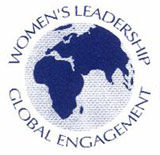 |
The UN in the 21st Century: Challenges and Opportunities
May 3, 2006 | New York, NY |
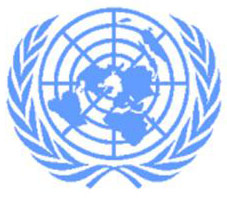 |
New York, NY—The Women's Foreign Policy Group held an all-day study visit at the United Nations headquarters featuring briefings with top UN officials and ambassadors, panel discussions, a luncheon, and a tour. The program covered democracy and development in the Arab world, the humanitarian crisis in Darfur, the UN in the 21st century, peacekeeping and peacebuilding, the image of the UN, and women and children's rights worldwide.
The series of morning briefings provided attendees with an in-depth understanding of the UN's policymaking processes, which important issues are currently under debate, and an insight into the factors that shape the decision–making processes of the UN. The event included a VIP luncheon which was attended by key UN officials and members of the diplomatic community. At the afternoon session, Shashi Tharoor, UN Under–Secretary–General for Communications, gave the keynote address and Ellen Løj, Danish Ambassador to the UN, introduced the new Peacebuilding Commission.
VIP Luncheon: The Future of the United Nations
 |
The Future of the United Nations
Shashi Tharoor
UN Under-Secretary-General For Communications and Public Information
"We should be in favor of reform. Not because the UN has failed, but because it has succeeded enough to be worth investing in...To change the world, we must change too."
|
 |
New Approaches to Peace: The Peacebuilding Commission
Ellen Løj
Danish Ambassador to the UN and Co-Chair of the UN General Assembly Working Committee on the Peacebuilding Commission
"The Peacebuilding Commission, in my view, is supposed to be something very practical, un-political, and very concentrated on the first phase of development: building the institutions."
|
Gillian Sorensen, Senior Adviser at the UN Foundation, Former Assistant Secretary- General for External Affairs
The UN Today: Expectations and Reality |
Anne-Marie Goetz, Chief Advisor of Governance, Peace and Security, UNIFEM
Gender Equality in the Work of the UN: Where are the Accountability Systems?
|
Oliver Ulich, Desk Officer for Sudan
UN Office Humanitarian Affairs
Dealing with Darfur
|
Ann Veneman, Executive Director, UNIFEM
Women and Children's Rights Worldwide |
Amat al Alim Ali Alsoswa, Assistant Administrator and Director of the Regional Bureau for Arab States, UNDP
Democracy and Development in the Arab World |
Edward Mortimer, UN Director of Communication Office of the Secretary-General
Communicating the Challenge and the Hope |
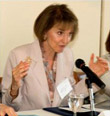 |
The UN Today: Expectations and Reality
Gillian Sorensen
Senior Adviser at the UN Foundation, Former Assistant Secretary–General for External Affairs
"[The UN] is an imperfect but indispensable institution and our challenge is to use it well and wisely."
|
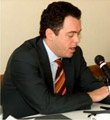 |
Dealing with Darfur
Oliver Ulich
Desk Officer for Sudan, UN Office for the Coordination of Humanitarian Affairs
"I think it's fair to say that we, as humanitarians, haven't been this worried for a very long time."
|
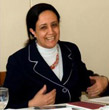 |
Democracy and Development in the Arab World
Amat Al Alim Ali Alsoswa
Assistant Administrator and Director of the Regional Bureau for Arab States, UNDP
"it is my candid view that a single most important factor in the drive for democracy and developement in the Arab world is the courage and activism of women."
|
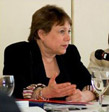 |
Women and Children's Rights Worldwide
Ann Veneman
Executive Director, UNICEF
"We cannot afford to compete in the field. The problems are too immense, we have to cooperate."
|
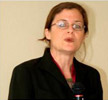 |
Gender Equality in the Work of the UN: Where are the Accountability Systems?
Anne-Marie Goetz
Chief Advisor of Governance, Peace and Security, UNIFEM
"...This is an important emerging area for accountability within the UN, to examine gender deficits, gender accountability failures at the nation state level, and to work on gender sensitive governance and accountability reforms."
|
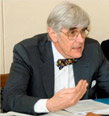 |
Communicating the Challenge and the Hope
Edward Mortimer
UN Director of Communications in the Office of the Secretary-General
"Someone has to explain why things go wrong, why this institution is not perfect, but why it is still essential and it can actually achieve things."
|
|
|